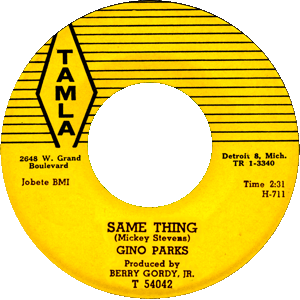Tags
 Tamla T 54042 (A), June 1961
Tamla T 54042 (A), June 1961
b/w That’s No Lie
(Written by Mickey Stevenson)
 The Motown career of Geno Purifoy, an Alabama-born gospel singer who recorded under the name Gino Parks after moving north and going secular, had got off to a decidedly shaky start. Originally signed to the label along with professional oddball and occasional duet partner Andre Williams, Motown had struggled to find a place for either of them. The story of how Gino Parks’ name wound up on the off-kilter Coasters parody Blibberin’ Blabbin’ Blues, originally credited to a new vocal trio, “Hank, Gino & Bob”, with Parks joining Satintone Robert Bateman and the excellently-named Henry Lumpkin, is told on that page.
The Motown career of Geno Purifoy, an Alabama-born gospel singer who recorded under the name Gino Parks after moving north and going secular, had got off to a decidedly shaky start. Originally signed to the label along with professional oddball and occasional duet partner Andre Williams, Motown had struggled to find a place for either of them. The story of how Gino Parks’ name wound up on the off-kilter Coasters parody Blibberin’ Blabbin’ Blues, originally credited to a new vocal trio, “Hank, Gino & Bob”, with Parks joining Satintone Robert Bateman and the excellently-named Henry Lumpkin, is told on that page.
Perhaps mercifully for Parks, that first record doesn’t seem to have made it as far as the shops – some sources state Motown didn’t even bother getting promos pressed up – but someone in the company clearly believed in him.
Accordingly, Gino got to take a second bite of the debut single cherry. He was removed from the low-profile Miracle Records subsidiary – only a few months old, but already looking like something of a lost cause – and transferred over to Tamla Records, paired up with the company’s newest and hottest songwriter Mickey Stevenson, and his record was produced by Berry Gordy himself.
Parks’ account in The Complete Motown Singles: Volume 1 has this song being almost improvised on the hoof; Mary Wells was late for a session with Stevenson and the band, Parks happened to be in the studio, and together they thrashed out the basic structure of Same Thing then and there. The result is a straight-down-the-line Fifties-style record, a raw, gutsy blast of coruscating R&B, more in line with Parks’ pre-Motown stuff than the “Hank, Gino & Bob” sides but much, much punchier.
The record starts out with a ruminative acapella intro, Parks ominously intoning “Whoa, I love you girl / But that’s something that worries me, yeah” in the finest blues fashion, and you don’t know where this is going or what’s about to happen. But then just under ten seconds in, he screams “ONCE, I GAVE UP MY HEART!!!”, and so begins a surprisingly infectious and swaggering early Motown non-hit. It’s not a fantastic song (it’s pretty simplistic and it doesn’t do anything unexpected), but it will get you dancing; this is probably the jauntiest, most alive dancefloor single the label had released since Barrett Strong’s Money (That’s What I Want) almost two years previously, a neater and more commercial song than the Contours’ similarly torrid Whole Lotta Woman a few months before.
The band, anchored by some well-judged bursts of jazz sax, are quick to settle into a groove that’s really little more than an unadorned Fifties dance number, but none the worse for it. Their robust, snappy performance is further evidence of the development of the Motown house band in mid-1961; musically, everyone involved has come on in leaps and bounds from those shaky, tentative first singles. Parks is on fine form, too; perhaps mindful of Berry Gordy in the producer’s chair, and aware that by being given Stevenson and a Tamla single, he’d been offered a break not afforded to some other Motown signings, he gives it his all, a full-throated, rasping delivery somewhere between Jackie Wilson and erstwhile bandmate Henry Lumpkin, jumping with ease between paint-stripping James Brown screeches and melodic softness. Lyrically, Parks recounts the story of an earlier failed relationship and admits he can’t help but worry he’s headed down a similar path with the current object of his affections. A fine song and a fine performance; not a classic by any stretch of the imagination, but a real breath of fresh air among innumerable downtempo doo-wop numbers and novelty records, and plenty of fun.
Nobody could have accused Gino of not giving it his all, but unfortunately the record failed to make any commercial impact on release. He wasn’t dropped, but Motown’s enthusiasm for breaking him as a potential solo star seems to have waned following the failure of this single. It would be over a year before Parks’ only other Motown single, the rousing Fire, would see a release, and there would be no more Gino Parks recording sessions with Berry Gordy at the helm; indeed, there would be precious few Gino Parks recording sessions at all, as the company went back to not knowing quite what to do with him.
(Footnote: The version of Same Thing on The Complete Motown Singles: Volume 1 omits the acapella intro, starting at 0:09 with Parks’ screamed first line proper. Presumably this was an accident rather than an editorial choice, as the liner notes don’t say anything about it; either that, or there were different pressings of the single out there unbeknownst to the compilers. Man, I’m such a nerd.)
MOTOWN JUNKIES VERDICT
(I’ve had MY say, now it’s your turn. Agree? Disagree? Leave a comment, or click the thumbs at the bottom there. Dissent is encouraged!)
You’re reading Motown Junkies, an attempt to review every Motown A- and B-side ever released. Click on the “previous” and “next” buttons below to go back and forth through the catalogue, or visit the Master Index for a full list of reviews so far.
(Or maybe you’re only interested in Gino Parks? Click for more.)
 |
 |
| Mable John “Looking For A Man” |
Gino Parks “That’s No Lie” |


Isn’t this record Rock n Roll rather than R&B?
LikeLike
It’s a pretty arbitrary distinction when talking about uptempo, blues-influenced late-Fifties/early-Sixties black music, so I think either label’s fine when discussing this one, really. It certainly meets the dictionary definition of rhythm and blues, having discernible quantities of both – but then so do a lot of more easily-classified “rock and roll” records.
Genre labels are only useful as descriptors; I don’t like to make use of them to classify records into different piles (or we end up wandering into “Pazz & Jop” territory).
LikeLike
It doesn’t help with defining R&R vs. R&B but I think what 144man might be talking about is non-subjective and very important distinction of whether each beat is subdivided in thirds (aka “shuffle” or “triplet” or “swing”) like this song, or evenly divided into halves or quarters (aka “duple” or “straight”) like Misery or Mighty Good Lovin’. Most 50s rock has the triplet feel – actually almost all North American music had the swing/shuffle feel prior to the influx of Cuban music in the late 40s and 50s and straight time became dominant only by the mid-60s. Ray Charles, for instance, seldom used a straight time feel. I’m trying to compile a list of the earliest uses of straight time in R&B and rock – especially in the 50s. At this point in the Motown survey we’re almost to 50-50 but still leaning towards shuffles.
LikeLike
That’s an excellent account and analysis of a single I’ve always been curious about ever since I copied both sides of it off the Soul LP “Switched on Blues” many decades ago. Your ambivalence about its musical qualities is a bit surprising, but there’s nothing wrong with having high standards. Being less discriminating, I find “Same Thing” riveting enough to deserve an A+.
LikeLike
To answer 144man’s question, during the rock ‘n’ roll era (1953-1966), if, one night, a black act played to a young white audience, that would make it rock ‘n’ roll. If the next night it played the same music to a young black audience, that would make it r&b. Same for radio. Unlike rock ‘n’ roll, rock (1966+) was more segregated for whites.
LikeLike
Wow, didn’t quite understand the difference like this. Thanx!
LikeLike
I LOVE this record, and often play it when I DJ here in London. It always gets people dancing, and Gino’s voice is really powerful. I recently managed to track down a vinyl copy of Fire, which is even more full-on than Same Thing…and the b-side, For This I Thank You, is great too. I’ve just got a copy of another 45 of his, Nerves Of Steel (on the Crazy Horse label), which doesn’t have quite the power of the Motown releases but is still, in my opinion, way above average.
LikeLike
Ooooo I like this song! Nothing like a gospel singer turned secular. That intro is insane! Gino’s vocals are electricfying. The only fault I can find with this song and the only reason I believe this song didn’t chart is because it was made too late. As 144man mentioned above this sounds much more like a Rock n Roll record instead of a Motown song. Regardless, good song.
LikeLike
First heard this on the UK album “Motown Memories volume 3” in May 1970 when it was already some 9 years old. At the time I thought what a cracking slab of rock-and-roll it was. Some superb saxophone work and it moves like crazy. However, when I finally acquired a single version in the 80s it didn’t seem to have quite the same punch and energy as the album track from 1970. So I went back to the album to see if my memory was playing tricks, but no it wasn’t, the album version was definitely more alive and enjoyable. The album version must be a different take and is in genuine stereo too. As the single was released in 1961 when all Motown output was mono I wonder when the superior stereo version was recorded. I found out a little later that the stereo version had been released in the US on the Soul label album “Switched on Blues” about the same time as the UK Motown Memories volume 3. Anyone know when the stereo version was recorded?
LikeLike
I’d bet that the LP version’s vocal recording was done in the same session as Gino’s single version. Gino was no longer with Motown when “Switched on Blues” was being put together. The basic background tracks were probably an alternate take from 1961. It was probably augmented and re-mixed and made into a stereo recording at the time of the LP’s production.
LikeLike
It’s interesting that Motown played around with this track for the album but not the flip side. “That’s no lie” also appeared on the UK album Motown Memories Volume 3 but this was the identical recording and mix used on the single, and was horribly re-channeled to give a ‘stereo effect’ which was done a lot in the UK to mono recordings on albums in the 1970s and was always a disaster.
LikeLike